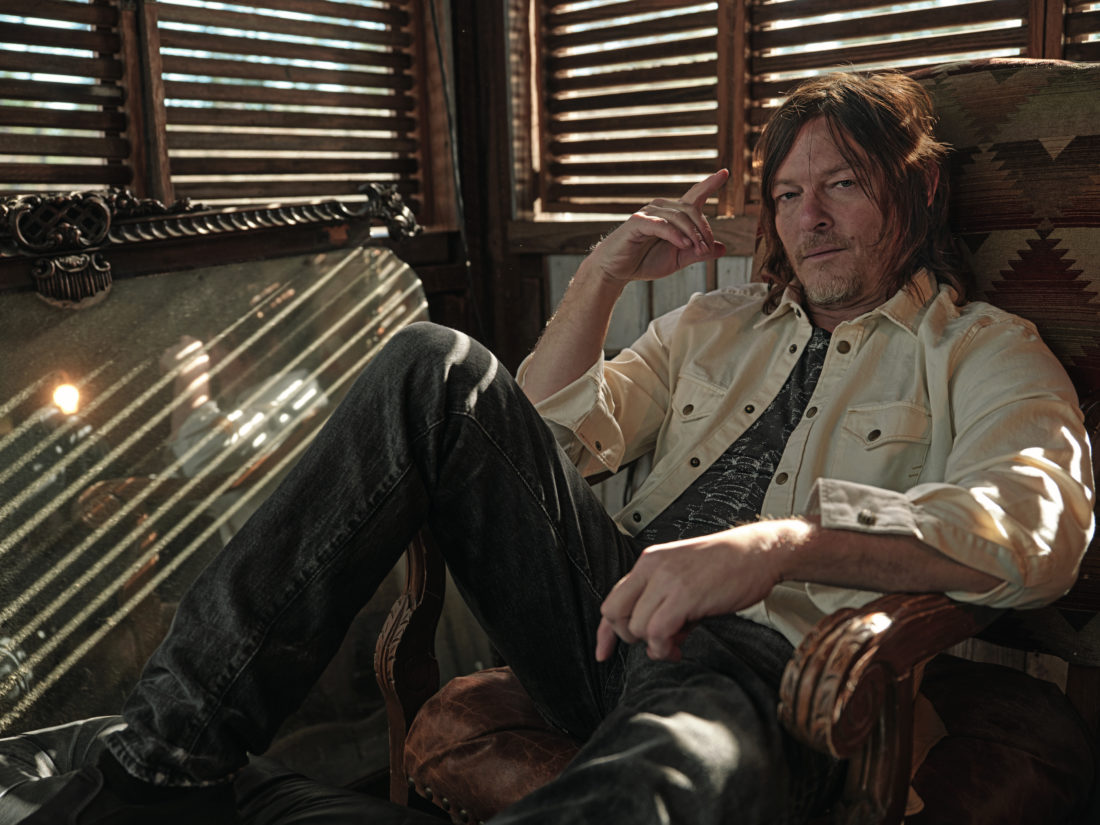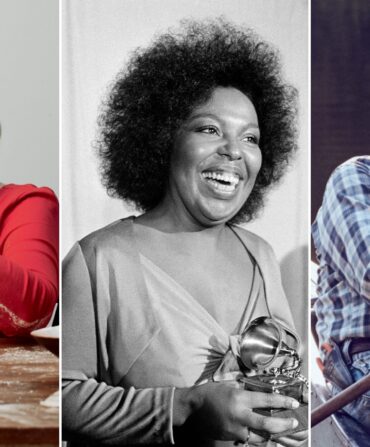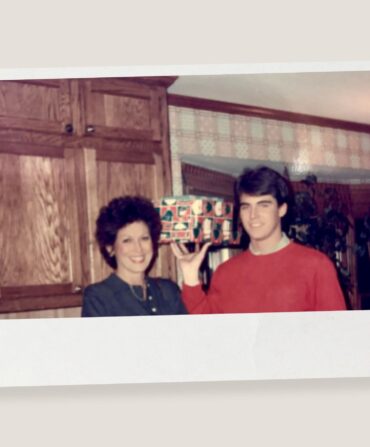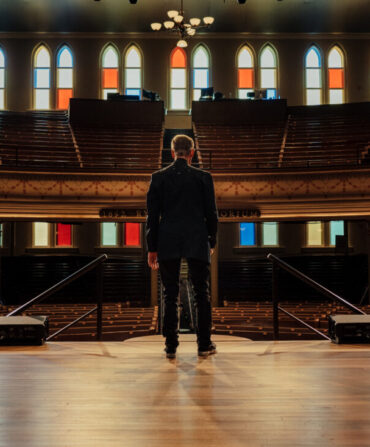There are memorable protagonists in postapocalyptic fiction, but few have the legacy or longevity of Daryl Dixon. After eleven seasons of AMC’s The Walking Dead, the character, with his crossbow and eagle eye, has become a hero in one of the most popular TV shows in history, brought to life with Norman Reedus’s effective glower and soft-spoken care. The Florida-born actor, fifty-three, now splits his time between New York City and Palmetto, Georgia, near where the series was filmed. Also a photographer and a motorcycle enthusiast, Reedus has his own AMC series about bikes, Ride with Norman Reedus, on which he takes celebrity friends like Robert Rodriguez and Josh Brolin on two-wheeled excursions all over the world. And while The Walking Dead just wrapped filming the last season of its epic run, Reedus is still revving up—his first novel, The Ravaged, comes out in April, followed later this spring by his new whiskey, Big Bald Head. Daryl Dixon is also getting a spin-off show. And Daryl’s iconic vest, soiled by the woods and years of zombie blood, complete with crossbow, is in the Smithsonian.
What’s life in Palmetto like?
I have a house that’s in the country, down a long dirt road. Everyone waves to me. I wave to them. If my package ends up at a house down the street, it’s not an inconvenience to go say hello and get it. I have an old Camaro that I drive around here. Or I get on a bike and head in a direction I’ve never been before. Everyone’s like, “Are you going to sell your house once the show’s over?” I don’t think I’m going anywhere. My backyard has a little creek going through it. Right before my dad passed away, he went back to his house in Raleigh. He loved magnolia trees, so I got one and planted it right outside his bedroom window so he could smell the flowers. Right next to my daughter’s little castle in the yard here, I planted a magnolia tree. It’s just now starting to get tall. Every time I look at that, it reminds me of my pop.
The Walking Dead has been part of your life for twelve years. How do you feel about it ending?
I’m a nervous wreck. Most television shows never go this long. And very few have as big an impact as this show has had, in pop culture, society. Part of me is just going to be sitting on the bathroom floor, with a drink, in tears. It’s bittersweet. And it’s a great accomplishment.
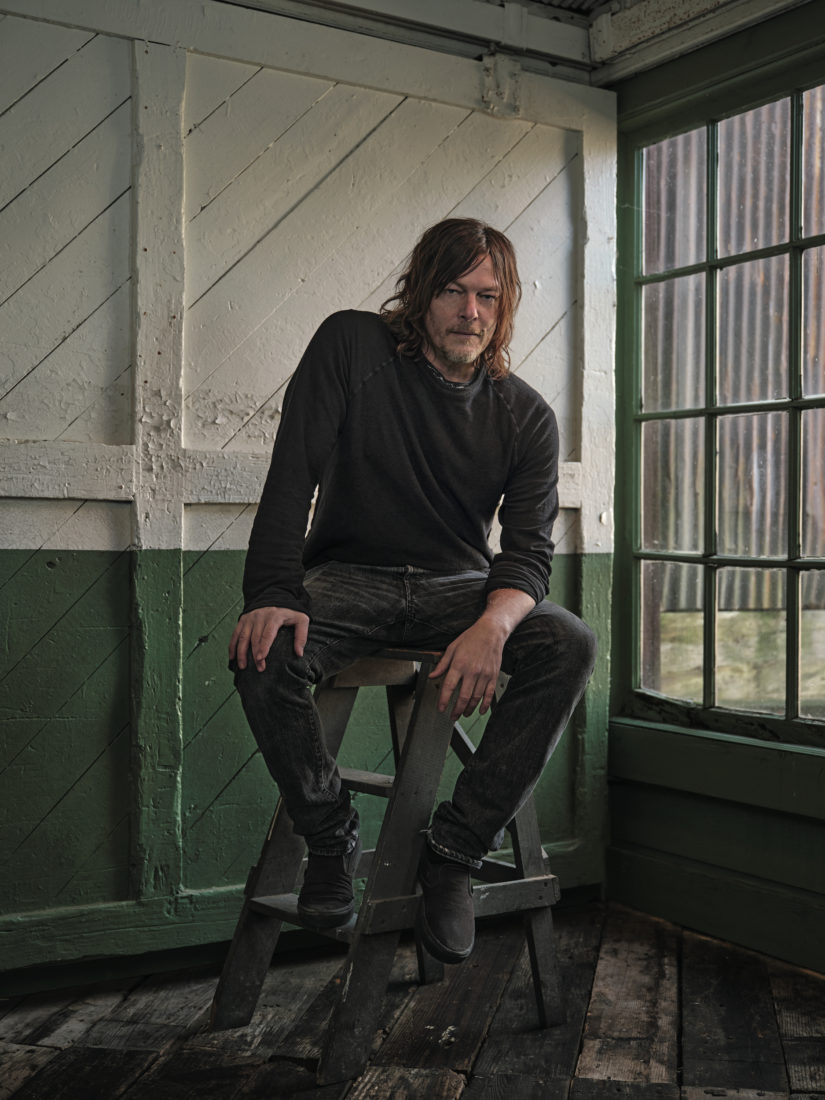
What has it been like playing a now-iconic TV character?
It was around maybe season two or three, when I was like, holy shit, this is big. I went to the CMA Awards in Nashville. They had me on a flight to go there. But I’m looking over at my motorcycle, and I’m like, f*** it. And I took a backpack and shoved a suit in it and started driving to Nashville. I didn’t know where I was going. I didn’t have a GPS. I wrote the directions on my arm in marker. I hit a crazy rainstorm and they washed totally off my arm. I’d stop for gas and directions, and one person would ask for a selfie…then I’d stop at another place, there’d be five people…then, at the next, ten. I guess people knew which road I was on. I finally went by a McDonald’s, and I looked up at the marquee, and it said, we love you norman reedus. I felt like Forrest Gump running across the country. The character has spawned a dozen TV commercials, a dozen video games. I have not really wrapped my head around it, to be honest.
Your new novel, The Ravaged, is somewhat of a road adventure. What inspired you to write it?
It’s three different story lines of people who were thrown out, or are searching for something. And they sort of find people along the road who change them—maybe indirectly because of The Walking Dead, and playing this character who finds that sense of home out on the road with strangers, and a sense of family. I’ve met so many people, and I’m a good listener. Sometimes, I’ll take someone’s story and think about it going in this direction, instead of that direction.
How did your new whiskey come about?
You play a country boy on a hugely successful television show and you ride motorcycles, you get a lot of the same endorsements: You want to make a motorcycle boot? You want to make a motorcycle vest? They’re all too obvious. I know a lot of motorcyclists in a lot of motorcycle clubs. And whiskey is the drink. I’ve had thousands of nights with my friends over the last couple decades where we’ve had a whiskey and really got into a heart-to-heart. And that’s where it all started. This whiskey is very smooth—the kind you drink and you want to be in your socks in front of a fire.
In an episode of Ride with Norman Reedus, you went to Asheville and rode the Blue Ridge Parkway. It seemed like a life-changing experience.
That road is so winding, and the first time I did it, it was in the back of a van. I thought I was going to throw up. But on a motorcycle, it’s like you’re the Silver Surfer. When you get up in those views, it’s a different feeling than riding in the city. I’ve done episodes in Tokyo, I’ve done episodes in Manhattan, and you know they’re fun, and it’s cool to see, and it’s all lights and beep beep beep, but the country rides are my favorite. And doing a ride like that, you really bond with that rider, and the conversation opens up.
What is it about being out on the open road that calls to you?
I don’t get free time. I’m always on a schedule. When I get a chance to be by myself and put the helmet on, there’s no phone, no pressure—that’s why I like to take rides without knowing where I’m going. To get on and just head toward the sun, until it goes down. Then stop somewhere, I don’t know where, and then come back and turn around when the sun comes up.


